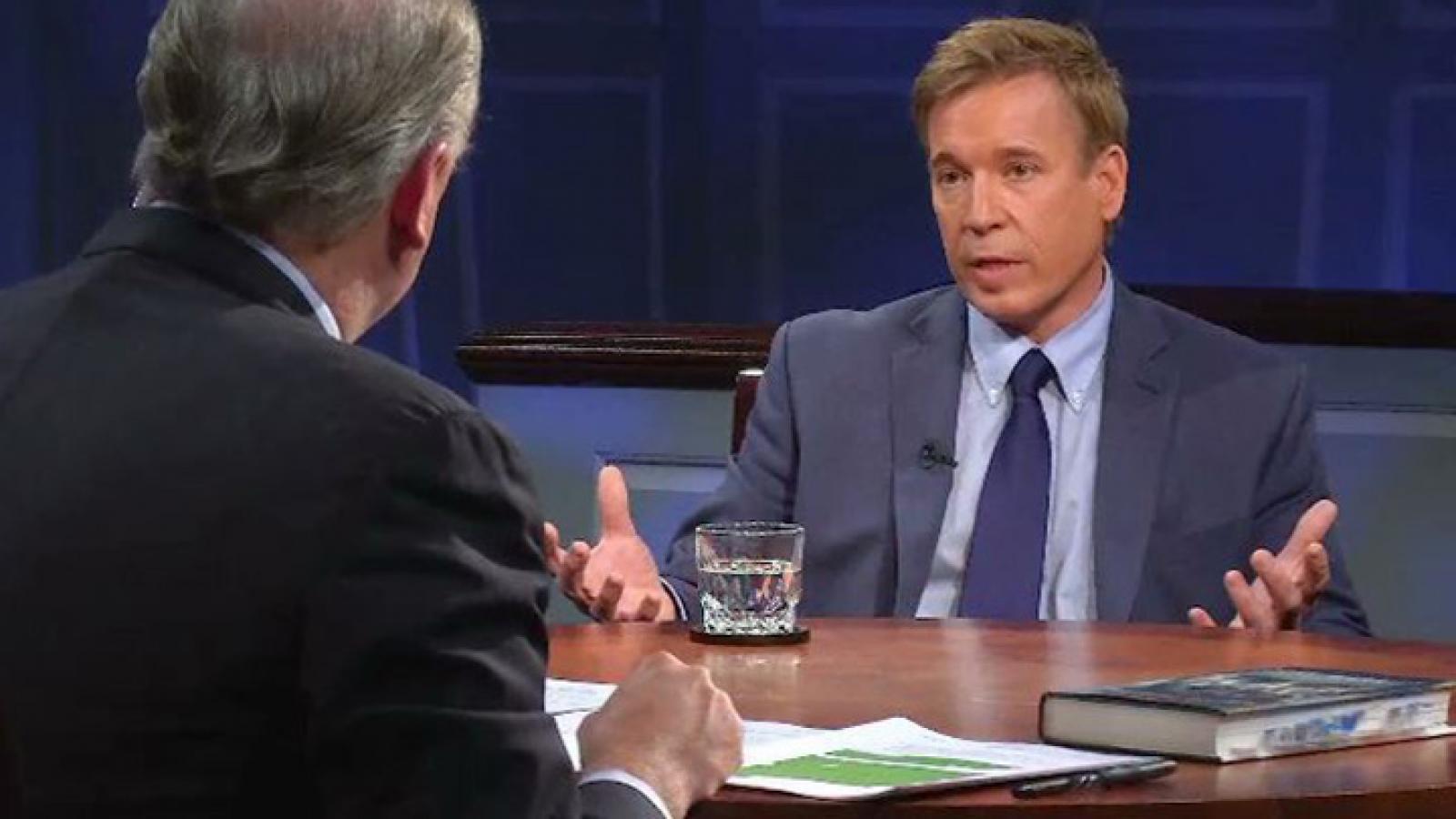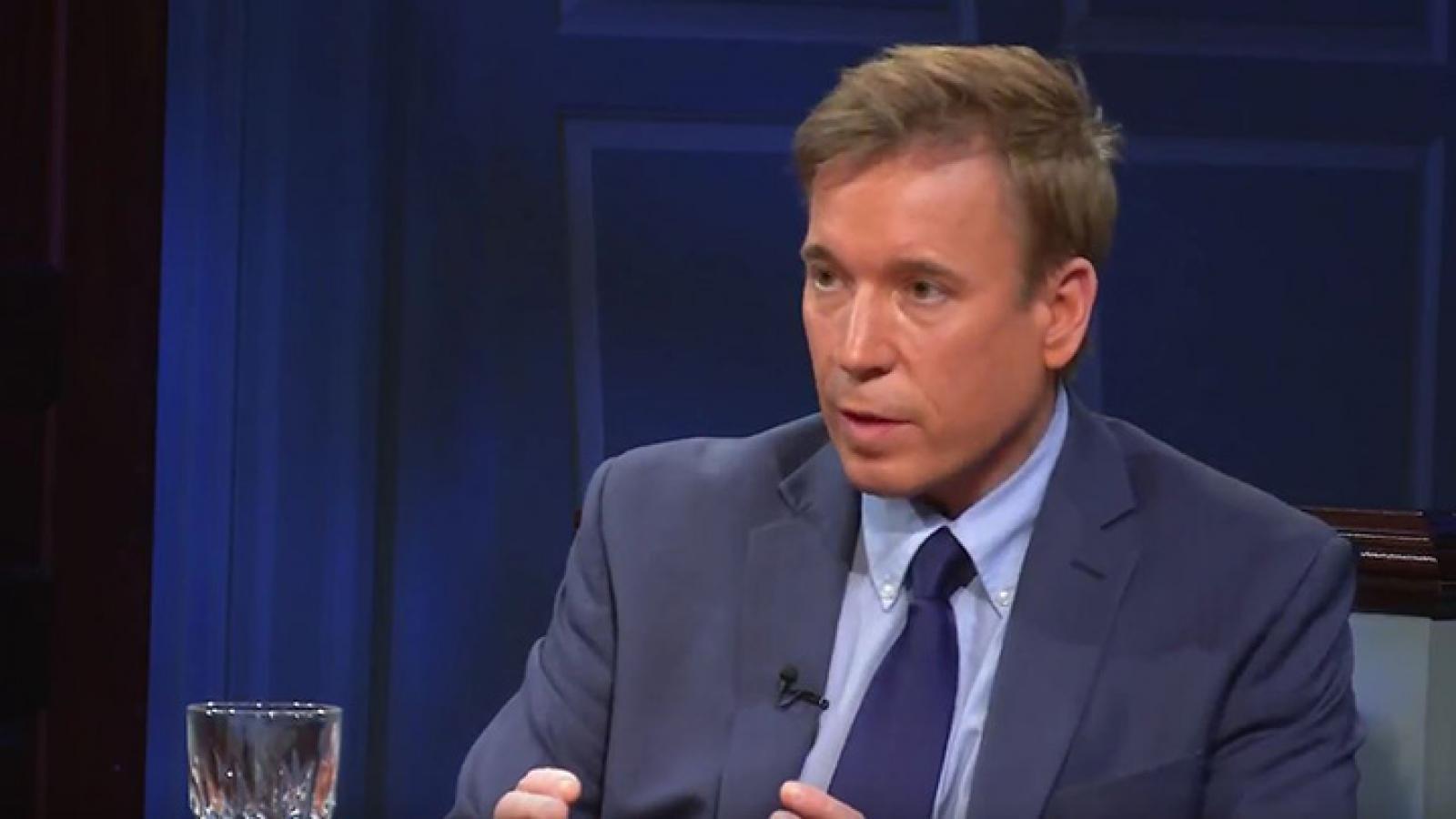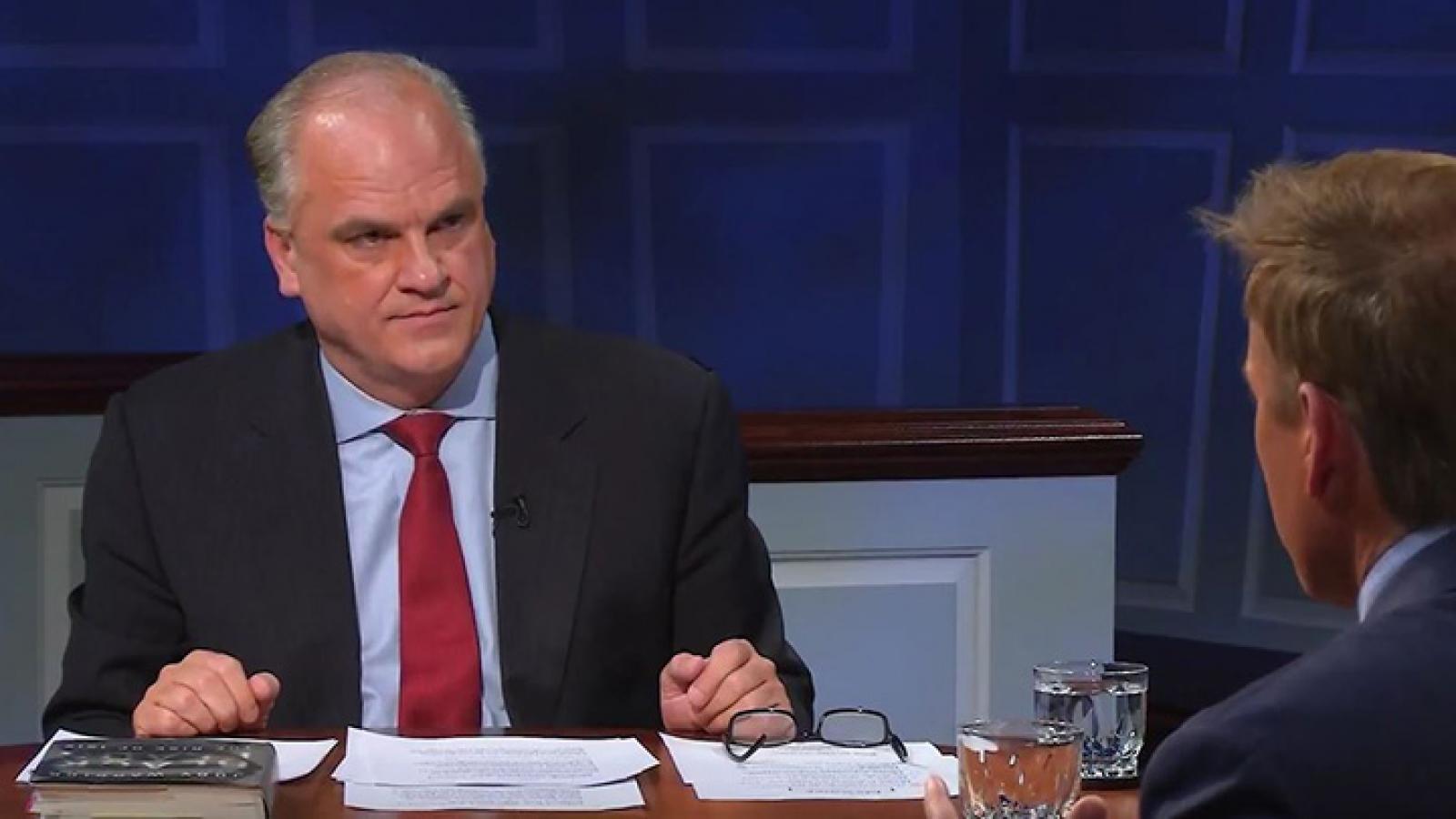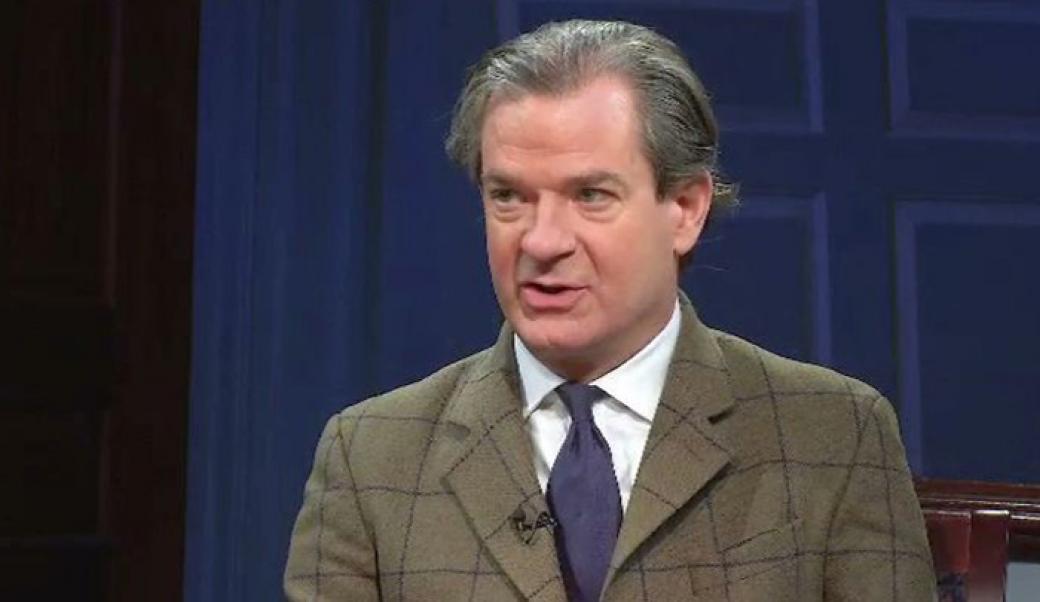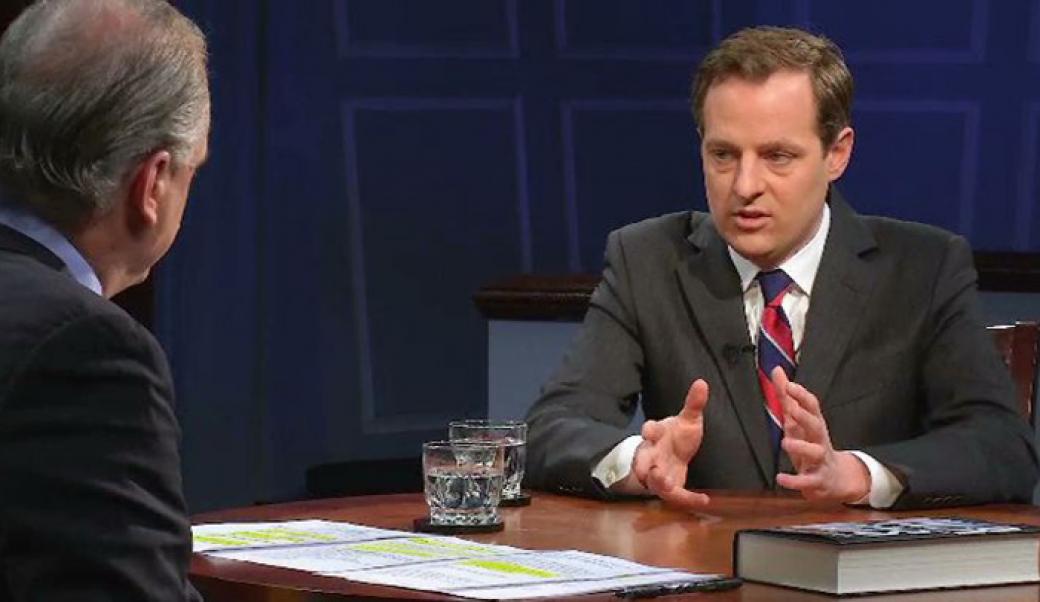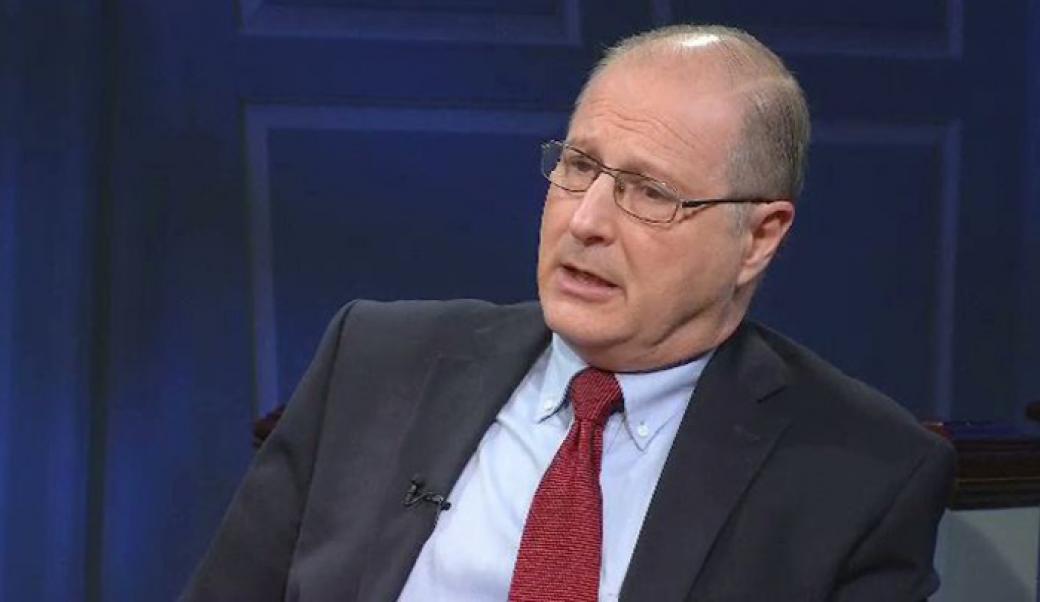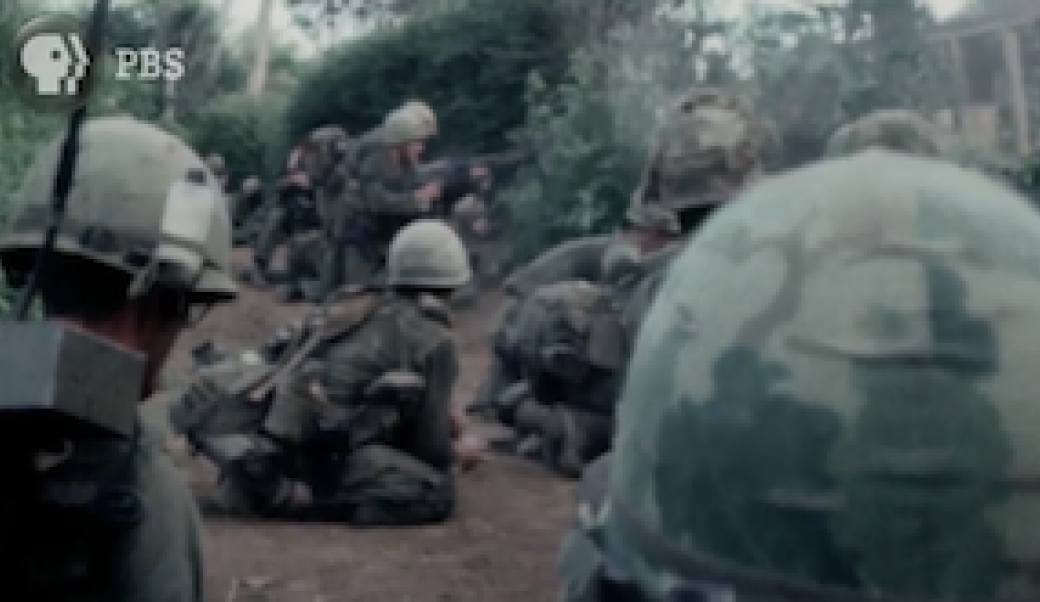About this episode
August 12, 2016
Joby Warrick
Joby Warrick is a reporter for the Washington Post and a winner of the Pulitzer Prize. In his new book, "Black Flags: The Rise of ISIS," he tracks the rise of the terrorist Abu Musab al-Zarqawi, the emergence of what is now called ISIS, and the strategic mistakes of Presidents Bush and Obama.
War and Terrorism
The rise of ISIS
Transcript
0:41 Douglas Blackmon: Welcome back to American Forum. I’m Doug Blackmon. When the United States withdrew most troops from Iraq in 2011, after a controversial invasion and troubled occupation, we left behind a politically unstable nation with a shattered military. Those vulnerabilities were quickly taken advantage of by what we now call ISIS, or the Islamic State, a ruthless new organization that seized territory and attention amid the anarchy of post war Iraq and the growing Syrian civil war. The group’s leadership shocked the world with both their willingness to engage in a level of brutality far beyond that of even other terrorists, and their sophisticated use of social media and western style propaganda, for promoting the establishment of a radical Islamist nation spanning the Middle East. In recent months, ISIS attacks have killed scores of people in Paris and Brussels, and an American couple inspired by the organization slaughtered more than a dozen innocents in San Bernardino, California. But the roots of ISIS extend far beyond Iraq, and its future, like the changing nature of terrorism itself, remains unpredictable. Our guest today is Pulitzer prize-winning Washington Post journalist Joby Warrick. He has written a new book titled, Black Flags: The Rise of ISIS, in which he traces the group's development since the 1990s, the background of its founder Abu Musab al-Zarqawi, and the ways in which the Bush and Obama administrations may have both missed chances to stop ISIS in its infancy. Joby, thanks for being here.
FACTOID: The Question: Did U.S. foreign policy failures create ISIS?
Joby Warrick: Pleasure, thank you for having me.
2:13 Blackmon: So, this organization that is being characterized by some people, some Presidential candidates even, as the United States’ greatest adversary in the world right now, but it also has this laundry list of names: ISIS, ISIL, Dash, or Daesh uh the Islamic State of Iraq, it was once al-Qaeda in
Warrick: Yeah, this is a group that goes back for much longer than people realize. It really had its start in a Jordanian prison back in the late 1990s. We have a group of radical jihadists who are too extreme for al-Qaeda even at the time. In fact as the story progresses we see that uh the leaders of the organization, particularly Zarqawi, th-the main leader, tries t-to hook up with with al-Qaeda and they don’t like him, they don’t trust him because he is too brutal and too extreme, but because this uh this group became so successful so early, particularly in Iraq, they became a force unto themselves, a rival to al-Qaeda in some ways a more dangerous presence than al-Qaeda and that’s what we’re grappling with today.
3:13 Blackmon: And, but break it down for us in terms of Zarqawi. That’s a name that some of us know, he’s now long dead, uh killed in a drone strike some years ago, but uh remembered as the spiritual leader, and the founder, and really the only architect of of this organization. But, but so back in the 1990s uh in those early origins of it, wh-what was it then? It wasn’t called ISIS, but also who was Zarqawi?
Warrick: Zarqawi is is probably the least person to ever run a terrorist organization. When he started he was he was illiterate, well not entirely literate, he could speak a little bit of read a little bit of Arabic, but he dropped out of high school, he was a hoodlum and a thug and and a guy who had been involved in drugs, he had tattoos. He was probably the least likely person you’d want to have in this role. But he he had a strong personality, a ton of charisma, and also some very radical ideas. And because he was almost illiterate and because he didn’t understand the Quran very well, he’s very happy to just twist religion to his own advantages because he didn’t rely on scholarship, he didn’t rely on theologians. He thought he knew what what Allah wanted him to do. So in that sense he felt almost in divinely inspired to lead this organization.
FACTOID: ISIS founder Al-ZarQawi killed by 2006 U.S. airstrike in Iraq
Osama bin Laden, as murderous and terrible of a guy he was, he did have a you know uh a program. A kind of a logical progression that he was trying to follow these guys are trying to make noise and and just create chaos and and they do it in in very smart ways sometimes. They do it in very brutal ways, and they embrace brutality as part of their methodology. So we see them early in the early days, in the Zarqawi era, you know beheading people and you know broadcasting it on the Internet. It shocked people in in the Arab world, but for it was that sort of radical message, this brutal message of Islam that was his calling card and that’s still what ISIS is today.
FACTOID: Osama Bin Laden was killed in Pakistan by Navy Seals in 2011
4: 49 Blackmon: He’s not just trying to get U.S. forces out of Saudi Arabia I mean that was the prime motivating factor for Osama bin Laden in the beginning.
Warrick: Yeah, there are a few powerful ideas that he latches on to that are that are continue to be a draw to recruits around the world today. One of them is is is this idea of building the caliphate, which is something that Al-Qaeda and that generation of of jihadists talked about in the abstract.
FACTOID: ‘Caliphate’ is the religious state ISIS leaders claim to be building
But Zarqawi had this notion that if you build the thing, if you actually create something tangible then it becomes an inspiration to people around the world who want to help your cause. And he also saw this inevitability to his moment. That over time he would be rewarded by Allah Himself and also he would usher in this end times battle. So he’s very much part of the conversation even back in the early 2000s he would talk about this great end battle that would take place not in Iraq where he was fighting but in Syria, and he named a particular village in Syria called Dabiq which is part of this the uh there’s some Quranic or Hadith writings that talk about this end times struggle and he and he said this is gunna be the big show down between the army of the West and the army of of Allah and its its and essentially his followers are marching towards that battle as we speak.
5:54 Blackmon: So Zarqawi is this guy who he’s involved in crime in Jordan, he’s Jordanian. But so, Jordanian intelligence is tracking him to some degree, but he’s he seems to be a fairly minor guy. He’s imprisoned, he actually is trained up in a sense.
FACTOID: Al-Zarqawi was imprisoned by Jordan for drugs, sexual assault
He he sort of finds himself in prison, realizes that he’s a good leader, realizes that he can organize people inside prison and he associates with his first religious advisor while he’s in prison. So, in a way he’s trained in the Jordanian prison, that is a special place for quasi terrorists I guess, but then he comes out. He starts starts an organization but it is still pretty obscure and but then there’s this moment I want to sort of skip up to this, but there’s this moment just before the invasion of Iraq uh where he and his nascent group are at a training camp out in Northern Iraq in the Kurdish area of ungoverned area of Northern Iraq and there’s a CIA agent or operative named Sam Faddis who’s in the vicinity and watching these guys and and finish that story. What, what happens?
Warrick: This is really an extraordinary moment because this is the time you’ve got al-Qaeda essentially has been driven out of Afghanistan so they’re on the run and one of the many exiles from Afghanistan in Zarqawi who had his own little training camp in Afghanistan in the early two thousands. He ends up fleeing to the border area between Iraq and Iran, this no man’s land where essentially above the no fly zone so he’s fairly safe there. But he really is a no body. I mean if you look back at his early history the things they’ve done before was they they had assassinated a U.S. diplomat which probably was their main achievement, but other things have been just trying to blow up symbols of Western corruption. They actually went into a pornographic theater, uh you know before he went into prison and and tried to blow this place up just as a protest. The bomber gets in there with his bomb gets so engrossed in the film he forgets what he’s doing blows up under his feet and he actually loses both his legs and nobody else gets hurt. But these are the kind of knuckle heads they were. Not a very inspired group, and and there’s a great story too about how when he finally did come to some prominence, journalists were hunting him down, they went to his home town to talk to his mom and said you know ‘how, how about your son this great terrorist’, and she said ‘he’s not that smart, what’re you talking about?’ [Blackmon: Can’t be him] He’s he’s surprised everyone and so yeah this is his moment where where these relatively unaccomplished people were hiding out and we had opportunities to take them out because this is right before the Iraq war started the the American government realized that they were potentially dangerous. They had a little chemical weapons factory they had cooked up there where they were poisoning dogs with cyanide and that kind of thing. And the U.S. administration considered very carefully at least three times whether we would launch a preemptive strike and and destroy this little cell. But they didn’t do it because we were right on the verge of the invasion of Iraq, and there was some fear that if we went in and did something that would up-upset the schedule upset our allies, maybe tip off Saddam Hussein too early then the whole thing could come crashing down. So this is a a missed opportunity. But by the time the did go in and try to take out Zarqawi and his gang the war had already started, Zarqawi had run to Baghdad to get ready for the Americans it was too late.
FACTOID: Saddam Hussein was Iraqi president from 1979-2003
8:49 Blackmon: But so, by then though, Zarqawi is a name that some people in the West have heard now but not shortly before that he’s actually a except to Jordanian intelligence and maybe the CIA to some degree uh nobody really has heard of him, none of no American citizen just following the news had probably heard about of Zarqawi until Colin Powell goes to speak to the United Nations to make the case essentially for the invasion of Iraq. But what exactly happened there and and why was it that that this obscure terrorist ends up as part of that speech to the U.N.?
FACTOID: Colin Powell gave speech to U.N. Security Council in February 2003
Joby Warrick: We all remember that speech, and that’s where the weapons of mass destruction claim was made for the U.N. Security Council in a very powerful way. Turned out that was completely wrong intelligence, but at the same time the other link we tried to make in that speech was to connect al-Qaeda so the authors of the 9/11 attack with Saddam Hussein’s government. There wasn’t much evidence, it was very circumstantial, there was an office at the pentagon, the office had special plans to try and argue that there were somehow connections, that Saddam was, you know, in cahoots with some of these al-Qaeda terrorists. The best strand of evidence they had was this guy named Zarqawi, who had been living in Northern Iraq, he was essentially in Iraqi territory and it was forbidden for Saddam Hussein to go there. But he had had past associations with Osama Bin Laden so it was a plausible connection, and Colin Powell plays this up very big in his speech, he actually puts Zarqawi’s picture up on the big screen saying this is our poster child, this is what we’re worried about, this nexus between a dictator and a very dangerous terrorist group. Turns out it was completely wrong because Zarqawi had no connection with the Iraqis at all. They were studying him just like we were studying; they were afraid of him. And they, uh, they certainly had no influence over him, they weren’t giving him anything. But that became part of the pretense that precipitated our invasion into Iraq. By doing that we not only sort of set this conflict in motion but we also gave this guy great celebrity.
FACTOID: U.S. invasion of Iraq began in 2003, troops withdrew in 2011
And this is actually, interestingly, the one part of the case that the CIA got right, because there were analysts at the agency who knew Zarqawi, they knew what his story was, they understood that he was a bad guy and dangerous in his own way, but they also knew he had nothing to do with Saddam Hussein. And the wishful thinking I think was with the, with uh, people in the Bush administration, particularly in the Pentagon, wanting to draw that connection. Grasping it at eh at the smallest shreds of evidence, to try to make this case that somehow Saddam Hussein had been part of 9/11 or somehow he could help al-Qaeda. And that was a very important part of the case for the American people, to say that there was some link between 9/11 and this guy we wanted to take over, to- to knock out of Baghdad, but it ended up having enormous consequences in these, sort of this, chain of events that all gets launched, really, with the invasion of Iraq a few months later.
11:25 Blackmon: Interestingly enough in the previous episode of this program we had as our guest Eric Edelman who was the national security advisor to Vice President Cheney at the time that these decisions
FACTOID: Eric Edelman also served as U.S. ambassador to Turkey 2003-2005
were being made. And the very first thing he said was I have no doubt Iraq is better without Saddam Hussein, and though that may be true, um, but then he said I have no doubt he was working on weapons of mass destruction programs. Uh, and then a few seconds later he said the programs were ongoing, the, there’s no question that he produced these weapons in the past, he used them on his neighbors and his own population, that’s true, but then we had every reason to believe he was still planning to develop those programs. It essentially was a sort of a reaffirmation of the speech, the speech that also gave us Zarqawi. But as a national security reporter, you know, who is following all this, what’s, what’s your reaction to that?
Warrick: Well it’s consistent, that’s for sure, I mean, uh, Dick Cheney’s memoir coming out just a few years ago essentially made the same justification, that while we didn’t find WMD, in fact Cheney acknowledges that, but he still believes that, that they did the right thing based on the intelligence they had. And they also do think that history will judge them fairly or, or, or you know, show them being right in their decision. That’s a much harder argument to make now given the mess that the Middle East is in. Uh, I don’t know of any analysts, even the intelligence community, that that follow this pretty closely that see it as anything other than a disaster that uh really unleashed forces that we’re having to deal with for decades afterward.
12:47 Blackmon: I want us to talk some about Obama. What was the counsel to President Obama at, at a, at a lynchpin moment, uh, when the United States perhaps could have taken a very different approach to Syria? What were they advising him and what was his reaction to it?
Warrick: Yeah, uh, and if you think about was going on in Syria at the time. So the revolution starts with the uprising starts in the spring of 2011, so we just passed the five-year anniversary. And so you have a, uh, you know, a fairly successful revolution in Tunisia, a very complicated one in Libya, and in Syria just all hell breaking loose literally. A dictator who is just putting his foot down and becoming very brutal toward his own people. And so I think it was a challenge for this administration wanting to get ourselves out of-out of Middle East conflicts, and and in really kind of pushing back against the administration’s own advisors about how to best navigate this, this new movement. We had all kinds of problems with the Russians, you know, blocking any effort in the U.N. to, to help in any meaningful way, or to have even sanctions against the Assad regime. And so the, the limited options available were to, let’s support modern rebels, let’s try to help,
FACTOID: Bashal Al-Assad succeeded his father as Syrian dictator in 2000
somehow, close this vacuum that’s come to exist, but those are very hard decisions and very hard choices. It’s hard to even now look back and say that if we would’ve armed rebels in Syria it would have made a big difference. But uh, the firm decision was made in 2012 that we essentially wanted to leave it alone, let it play out itself. And ISIS is very, uh, you know, smartly exploited that situation, exploited that vacuum to come to power.
14:12 Blackmon: But there are plans to, to, to try and arm the rebels, arm the right rebels and take a much more muscular approach in that period, and in the end at least by some accounts, it’s President Obama himself who essentially says no, we’re not going to do that.
Warrick: There was a key moment and it, in early 2012 when you do have advisors like Hillary and, and, uh Vice President Biden, and also, uh, Panetta, Petraeus, all these people essentially arguing that, you know, it’s time we do something to try and help the situation, it-it’s really getting quickly out of control. I’ve talked to some of the NSA people who were there at the time, and they were watching these bad guys come into Syria and becoming more and more powerful, getting more recruits coming from the outside. And they were becoming very alarmed about what was happening in that security vacuum. And the President looked at that and he took it very seriously, there were a number of meetings in which it was discussed, but he ended up having what essentially was a minority view within his own cabinet, which is that um, uh, you know the question he asked was can you point to a situation where we got involved helping an insurgency and it’s really turned out well for us? Is this going to be some, you know, where is it going to go, what is the outcome. Can we arm these rebels and really expect they’re going to be able to defeat Assad, who’s backed by the Russians, who’s backed by the Iranians. So he raised really good questions. It wasn’t uh the majority opinion in his own cabinet but it turned out to be the view that prevailed.
15:26 Blackmon: But here we have the Russians pop up and uh, and uh arrive in a very significant way, and then pull back out. And which one could say, well that’s an exa- why couldn’t the U.S. have done the same thing, you know, they didn’t get bogged down, they’re not stuck there taking losses every single day. Do do we lack the imagination somehow to realize that there is a way to engage in a very muscular way and then get back out before you’re in a deep bog?
Warrick: Well, you know, Hillary very smartly called this the problem from hell. I think for Russia it was a more easy decision because they’re helping an ally that actually did have the ability and the forces on the ground to retake territory. So they essentially gave Assad’s forces the boost they needed to retake, Palmyra we just saw this past week and, and to take over a, a, other parts of the country that they’d lost to ISIS. For us, it would have been a matter of, you know, who are we arming, who are we supporting. We’re arming people that aren’t really trained fighters for the most part. They have limited means, would it have made a-a big difference, could we have bombed our way out of the problem, we’d certainly been trying that for the last few months with some fairly limited success. So it was, it was a tougher thing for us to do I think.
16:34 Blackmon: We have crossed off if you go back to that original list of al-Qaeda bad guys that was put out right after 9/11, huge majority of them are dead, if not all of them of of those those playing cards with their faces on them distributed by the government. Uh but so in the end, does it do any good?
Warrick: Zarqawi was a big loss I would argue just because he was such a presence, such a charismatic leader and it took the organization a while to recover from that. Even today though it’s interesting that he’s almost become an iconic figure in a way that that Osama Bin Laden was and maybe even more because when you look at jihadist videos and literature they lionize Zarqawi still because he was the guy with the machine gun and sort of looked like a ninja and when he wore American Nike sneakers and cut off American’s heads with his own hands. And so he was someone who continues to inspire and I think that was a big loss that he was killed. At the same time one of the things that’s interesting about ISIS is that logistically they’re very smart. They’re very good at building an organization, about having parts that change that can fill in if one part gets taken out, so even amidst all these airstrikes and all this pressure from various fronts, they still run countries, they still have their caliphate that operates as a state and they still have you know an infrastructure that can pay troops on time and deliver ammunition and that sort of thing. So they are kinda discounting the loss of leaders which they do you know that does happen from time to time. Eventually if you start taking out too many mid level managers and too many of the senior ones it gets more hard for them to operate and I think we’re trying really hard to do that.
18:07 Blackmon: There actually aren’t very many Americans that have volunteered and become part of this, far more Europeans who have done that. It’s still sort of inexplicable to Americans I think particularly to someone who is fully inculcated into American culture, this place that most Muslims say this place is actually the friendliest place in the world to live a life as a Muslim.
Warrick: We’ve seen probably a hundred different reasons why people join and everything from people just looking for adventure, looks like a big video game so they go off to play Call of Duty except it’s in Syria but I think what seems to be most attractive to most of the ones that we’ve looked at is the idea of the caliphate. You know it’s not just joining some shadowy terrorist organization where you’re living underground and maybe gonna carry out some deed. They’re joining a cause and for them it’s the greatest cause of modern times because they’re rewriting history. You know a century ago at the end of World War I, the Allies divided the Middle East in countries that didn’t exist before. They took what was once kind of a Muslim caliphate, at least in their minds, and turned them into states that would be oriented to the west and would sell products to the west. They’re rewriting that whole history; they’re reasserting this legitimacy of an Islamic State. That’s a very powerful notion even to people who aren’t jihadists, it really resonates with a lot of them and you throw onto that the idea that Allah is coming back and there’s this great end times battle, why wouldn’t you want to be a part of that? So it’s a very attractive message for a lot of special first, second generation you know African immigrants from North Africa and Middle East who live in Europe.
19:35 Blackmon: You know it sort of sounds terrible to say this, it will sound terrible to some, I for myself I think the sort of dawning moment okay I think I get this thing now finally, was when I realized that these passions, these religiously based passions about this idea of the end times, this desire to be part of this final union with Allah in a sense, and if I reach back into my own fundamentalist Christian roots and realize that okay it’s not that different in terms of what the appeal of this thing and why it is we are able to believe things that on a purely rational basis, don’t seem to quite add up but put into this narrative becomes a very, very powerful thing and the sad thing of course is that almost all of these young men in particular who volunteer to do this thing end up dead.
Warrick: It’s interesting, we’ve spent a lot of time studying the militants who were involved in the Paris strikes and the Brussels strikes which everyone’s familiar with and you see an additional overlay with some of these. Some of them were very troubled men, very much like Zarqawi in a way, people who were high school drop outs, they’d been in jail, they’d been in trouble, and this this sense of the caliphate, this sense of fighting for Allah is a way for them to turn their lives around and you see the same pattern over and over again troubled young men who really had no passion for an idea for their lives and becoming very devoted to the cause and these are the ones that are willing to potentially be suicide bombers and commit atrocities cause they do feel like they have a cause that is very important, the most important cause in the world for them.
21:09 Blackmon: Anyone who can see how many tabs I have in the book can see how closely I read it, but as the book is ending what has happened is perhaps the most horrifying atrocity committed by ISIS and that is this captured Jordanian fighter pilot is burned alive and that’s recorded and broadcast on the internet. But there is this great outcry and the book ends on a somewhat optimistic sense with this scene of more Jordanian pilots flying off into the sunset and kinda it felt a little bit to me like the end of a world war Two movie in the sense that finally the good guys are waking up and are going to aggressively crush this terrible thing. But it doesn’t feel that way now a year or 14 months later so what happened?
Warrick: I think that we can hopefully look at this in a few years and still see this as a turning point. You can’t understate the the importance of these Arab governments, these Muslims governments as allies to us and when you see them getting upset to a person sort of by this awful death of this pilot who isn’t just executed but is burned alive which is explicitly forbidden by the Quran. So you know they didn’t seem to sometimes react so horribly to these beheadings but something about this this burning of a human being, a Sunni Muslim, by ISIS you saw this popularity in opinion polls plummet to low single digits. ISIS in its home territory is under pressure. They’ve lost something like over 40 percent of the territory they held a year ago. And its not just military defeats which they’re getting from all sides, on ground as well as on the air. But they’re losing finances. The oil flow used to have a huge black market oil flow to Turkey and places, now their infrastructure has been destroyed. They don’t have tankers anymore to move it; they don’t have oil refineries anymore; oil has been destroyed. So they are lashing out to show that they’re still relevant, to show that they’re still powerful. At the same time they managed to seed the organization across the world. They are at least eight official mini caliphates that exist in places like Libya, Yemen, even in Afghanistan now and 50 other, sort of wannabes, accolade organizations that claim to be a part of ISIS’s network. And even worse you have this problem of 35,000 people who’ve come through ISIS’s ranks and have been trained and indoctrinated, at least 5 to 6,000 from Europe, many of them back home again. So regardless of what happens to the caliphate this is a problem that continues to give us headaches for many years to come.
FACTOID: The Question: is ISIS growing stronger or being slowly defeated?
23:37 Blackmon: A year from now, they’ll be a new president. If there’s a new president that’s recently been inaugurated and you’re fortunate enough that you get to sit down with that person for 15 or 20 minutes and the new president says Joby tell me the one thing or the two things that are the most important things, I don’t have time to read you book, what are the two things I really need to know or need to do to try to get back on a better path uh for the United States in Syria in this, or in the battle with ISIS.
Warrick: I think the, probably job one is to make very clear that we and our friends, our allies in the Muslim world are all on the same side in this fight. You see uh more courageous leaders such as Jordan’s King Abdullah starting this movement called the Amman Message where he’s getting, you
FACTOID: Saudi Arabia, Qatar, U.A.E., Jordan, Bahrain are U.S. allies in Syria
know religious leaders from all around the world from every sect you can think of, getting together, around a message that say, Islam is a tolerate religion. We reject these extremists message, we want to send this message, not just as as religious leaders, but we want to put it down at the local mosque. We want to make sure the people, (coughs) excuse me, in the, in religious universities and schools are communicating this view of Islam. This is something we need to get around and help them make this message very clear because it’s, it’s not a fight that’s going to be you know, over next month or next year. Even if we manage to destroy this caliphate in Syrian we have a very long term fight ahead of us and we need good Muslim allies on our side and we need to make that clear from the White House on down.
25:01 Blackmon: Well thank you for writing this book that I think has brought a kind of clarity too all this in a way that I didn’t have before and that I think that people should read. And I don’t say that about every book. Joby Warrick, thank you for joining us.
Warrick: Thank you so much, I enjoyed it.
Blackmon: The book is Black Flags: The Rise of ISIS. We hope you’ll join this conversation with American Forum on the Miller Center Facebook page, or by following us on Twitter @douglasblackmon or @americanforumTV, or @jobywarrick. To send us a comment, watch other episodes, download podcasts or read a transcript or to read more about fresh approaches to the next president’s first year in office, visit us at millercenter.org/americanforum. I’m Doug Blackmon. See you next week.
